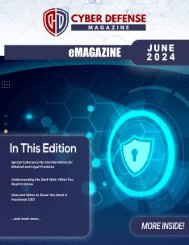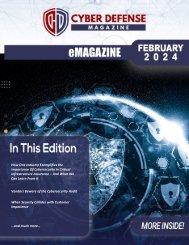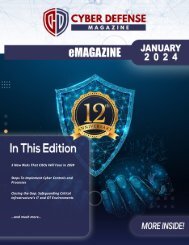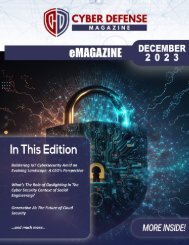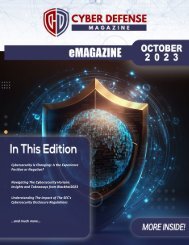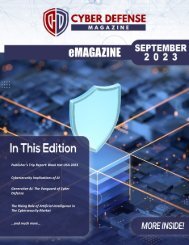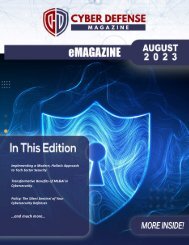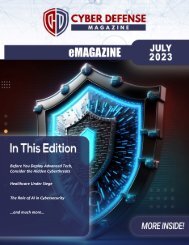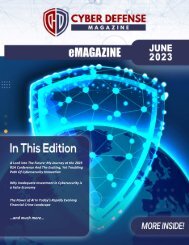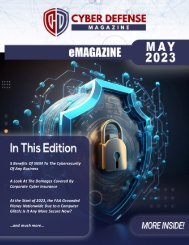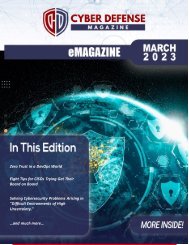Cyber Defense eMagazine December 2019
Cyber Defense eMagazine January Edition for 2020 #CDM #CYBERDEFENSEMAG @CyberDefenseMag by @Miliefsky a world-renowned cyber security expert and the Publisher of Cyber Defense Magazine as part of the Cyber Defense Media Group with Pierluigi Paganini, Yan Ross as International and US Editors-in-Chief and many more hard working amazing contributors!
Cyber Defense eMagazine January Edition for 2020 #CDM #CYBERDEFENSEMAG @CyberDefenseMag by @Miliefsky a world-renowned cyber security expert and the Publisher of Cyber Defense Magazine as part of the Cyber Defense Media Group with Pierluigi Paganini, Yan Ross as International and US Editors-in-Chief and many more hard working amazing contributors!
You also want an ePaper? Increase the reach of your titles
YUMPU automatically turns print PDFs into web optimized ePapers that Google loves.
22<br />
You can prevent (or decrease) the chances of such cyber-attacks by:<br />
• Curbing the use of public Wi-Fi connections for performing sensitive tasks like making online<br />
payments or file sharing.<br />
• Employ a Virtual Private Network (or VPN) when accessing from a public place. The use of VPNs<br />
keeps your online activities safe from being intercepted by hackers.<br />
4. Ineffective Privilege Management<br />
Are you providing the bulk of your users with unrestricted rights and privileges to your security network?<br />
Or do you have many users with “admin” privileges?<br />
Neglecting the security risk posed by human users can be harmful to any business. This can involve<br />
granting admin privileges or access to critical business data to temporary workers, freelancers,<br />
consultants, or even your clients. The April 2018 Credit card data breach reported by Lord & Taylor that<br />
compromised 5 million credit cards along with other data breaches in 2018 could have been prevented<br />
through proper privilege management.<br />
As most security networks allow full account privileges to admin users, hackers try to break into admin<br />
accounts to gain access to the backend data. The following privilege management practices can be useful<br />
in improving cybersecurity:<br />
• Restricting the number of admin users to only those who actually need it.<br />
• Assigning user rights and privileges on the basis of user roles.<br />
• The additional approval process for high-risk tasks such as deletion done by admin users.<br />
• Withdrawing access rights with third-party users at the end of the working relationship.<br />
• Annual training programs with employees to understand safe cybersecurity practices.<br />
5. The “Outdated Network” Problem<br />
Regardless of which network technology or tool that you use, they have to be regularly updated to fix any<br />
crucial security bugs that hackers can abuse. The 2018 case of the Spectre and Meltdown security flaws<br />
in computer CPUs affected a bulk of computer processing equipment that needed the release of security<br />
patches and fixes for hardware & software, along with operating systems.<br />
While countering every attack may not be possible, you must be well-versed in the overall architecture<br />
and structure of your security network and implement practices to keep all your tools and website<br />
components updated to their latest version. Along with the latest anti-virus software tools, deploying




